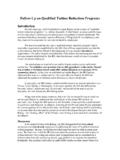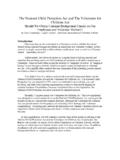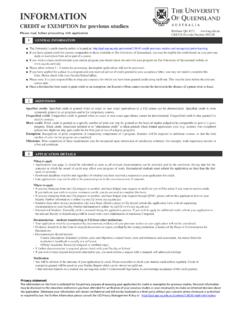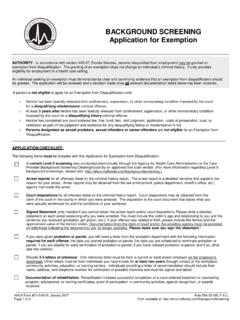Transcription of Operating Under the Church Umbrella - Educator …
1 Operating Under the Church Umbrella Introduction Most of the schools in the American Association of Christian Schools ("AACS") operate Under the Umbrella of a local Church ministry. Under current federal law, churches are considered to be tax-exempt organizations Under Section 501(c)(3) of the Internal Revenue Code, without the necessity of applying to the Internal Revenue Service ("IRS") for tax-exempt status. Schools that operate Under the Umbrella of a Church ministry enjoy the same tax-exempt status as their sponsoring churches. Some AACS schools, however, do not have a local Church sponsor. Those independent schools that do not operate Under the Umbrella of a local Church ministry must file a formal application with the IRS seeking tax-exempt recognition .
2 The IRS routinely grants these applications on the grounds that the independent school is a religious or educational organization that qualifies for tax-exempt recognition Under Section 501(c)(3) of the tax code. Because religious schools can obtain tax-exempt recognition , we are sometimes asked whether a school that operates Under a larger Church ministry should ever consider obtaining its own, separate tax-exempt status. In this Legal Report, we will discuss three different scenarios in which a school may want to consider the idea of obtaining tax-exempt recognition apart from its sponsoring Church .
3 Discussion A. What does it mean to be a "tax-exempt organization"? Generally speaking, a tax-exempt organization is an entity that is not required to pay federal income taxes. The tax code includes many different categories of tax-exempt organizations, but churches and Christian schools fall Under the group listed in Section 501(c)(3) of the code, , charitable, educational or religious organizations. Churches enjoy automatic recognition as tax-exempt organizations Under the tax code. For that reason, churches are not required to file a formal application with the IRS seeking tax-exempt recognition .
4 While churches are automatically recognized as tax-exempt organizations Under Section 501(c)(3) of the code, schools that desire their own tax-exempt recognition must go through a formal application process with the IRS. Those entities that come within the definition of tax-exempt organizations listed in Section 501(c)(3) have another distinct advantage. That advantage is that most gifts or donations to 501(c)(3) organizations are tax-deductible for the donor. This advantage encourages individuals and corporate donors to make contributions to churches, religious schools, and other charitable organizations.
5 B. What situations might occur that would cause a Christian school to consider obtaining its own tax-exempt recognition from the IRS? As noted above, a religious school that operates as a ministry of a local Church enjoys the same tax-exempt status as the Church . For that reason, a Church school is not required to seek separate tax-exempt recognition from the IRS. Nevertheless, situations may arise in which the Church school either desires - or is asked - to seek its own, separate tax-exempt recognition . We will address three of those situations below. Please note, however, that this list is not exhaustive, and your ministry may encounter different scenarios in which the issue of separate tax-exempt recognition for the school should be considered.
6 1. A corporate donor wants to make a large contribution to the school, but does not want the gift to go to - or through - the Church . A Church school could encounter a situation in which a corporation (or an individual) desires to make a donation to the school, but, for a variety of reasons, wants the donation to go directly to the school and not through the Church . Two different problems can arise in this situation. First, the donor might refuse to make the donation to the Church school because the school does not have its own "determination letter" from the IRS. And second, the donor might refuse to make the donation to the school because all gifts to the school must go through the Church .
7 As is discussed below, neither of these problems would arise if the school has obtained its own separate, tax-exempt recognition from the IRS. Problem #1 - The school has no "determination letter." When an organization files a formal application with the IRS seeking tax-exempt recognition , the IRS sends a letter to that organization in which the IRS makes a "determination" as to whether the organization has met the necessary requirements to become a tax-exempt organization. This letter is known as a "determination letter," and the information in this letter will tell a corporate donor whether the organization is entitled to receive tax-deductible donations.
8 Many corporations, foundations, and wealthy individuals will not make a donation to an organization without first reviewing the organization's "determination letter." As noted above, because churches are automatically recognized as tax-exempt entities Under the tax code, they are not required to file an application with the IRS seeking tax-exempt recognition . This means that most churches - and most Church schools - do not have a "determination letter." In fact, a Church will never receive a "determination letter" unless it goes through the formal process of filing an application with the IRS, and receives written recognition as a tax-exempt entity.
9 For most corporate and other sophisticated donors, it is not enough to say, "but we are tax-exempt just like the Church ." To the contrary, most such donors - and their professional advisors - must see a "determination letter" prior to writing a check. In the vast majority of situations, when the school operates as a ministry of the local Church , it will not have the "determination letter" that the corporation, foundation, or individual requires before making a donation to the school. Problem #2 - All gifts to the school must go through the Church . In many Church organizations, a gift to an individual ministry of the Church must be "made out" to the Church , and it must go through the Church .
10 One reason for this is that the only entity that is officially recognized by the IRS as a tax-exempt organization is the Church . In other words, if the school operates as a ministry of the Church , then it is not recognized as a separate tax-exempt entity, and the donor cannot send the gift directly to the school. Accordingly, the gift must go through the Church . This situation causes a problem for certain corporate donors. While corporate policy may allow donations to go to schools for educational purposes, that same policy may prohibit gifts to churches. Therefore, if the school says that the gift must go through the Church , the corporate donor may find another place to make the donation.








